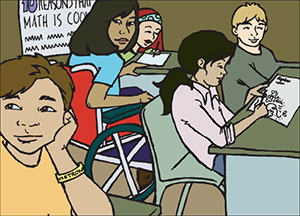What might Ms. Torri consider to help her students stay on task and also help her regain some lost instructional time?
Page 2: Self-Regulation
 Two of Ms. Torri’s students, Alexandra and Zach, have problems with self-regulation. That is, they have not learned how to control their own behavior. Though self-regulation is a critical skill that most students learn fairly early, some students, including those with learning disabilities or attention deficits, seem to have difficulty doing so. Fortunately, there’s a solution: Ms. Torri can teach her students self-regulation strategies.
Two of Ms. Torri’s students, Alexandra and Zach, have problems with self-regulation. That is, they have not learned how to control their own behavior. Though self-regulation is a critical skill that most students learn fairly early, some students, including those with learning disabilities or attention deficits, seem to have difficulty doing so. Fortunately, there’s a solution: Ms. Torri can teach her students self-regulation strategies.
For more than thirty years, researchers have demonstrated the effectiveness of self-regulation strategies. Their findings are summarized in the boxes below.
Benefits for Students
 Students learn to work independently and develop flexibility skills.
Students learn to work independently and develop flexibility skills.- Students gather assignments, complete the expected task(s), review the completed work, and continue on to the next assignment.
- Students experience success because they stick with challenging problems in order to find solutions.
(Reid & Lienemann, 2006; Winne, 1997)
Benefits for Teachers
 Self-regulation strategies reduce disruptive problems in the classroom by encouraging students to manage their own behavior.
Self-regulation strategies reduce disruptive problems in the classroom by encouraging students to manage their own behavior.- Such strategies provide teachers with time to work with small groups or one-on-one with students who require extra instruction.
- They also increase teachers’ appreciation for students who are able to self-regulate their behavior.
(Reid & Lienemann, 2006)
Benefits for Students with Disabilities
 Students become more active and responsible learners rather than passive ones.
Students become more active and responsible learners rather than passive ones.- They recognize the importance of contributing to their learning environment.
- Students regulate their behavior and think of alternate ways to deal with frustrating situations.
- They analyze their behavior, identify problems, determine why certain behaviors occur, predict when problems will arise, and learn how to avoid these incidents.
(Ellis & Friend, 1991; Lovitt, 1973, 1977; Smith & Rivera, 1993)
Tom Lovitt, Professor Emeritus from the University of Washington and a pioneer in the field, reflects on his work (time: 1:16).

Transcript: Tom Lovitt, PhD
There’ve been a number of names that people have used like self-management and self-determination and self-regulation. A lot of people have used self-control, self-responsibilities, self-instructions, self-directed, personal management; there’s a whole lot of those. I think one thing you need to do is to think about why do you want to get into self-regulation in the first place. A lot of data shows that it improves performance of students. Another reason is it increases pupil self-confidence. Another reason for getting involved in it: It increases chances of generalization. And I think another reason for getting into it is it provides practice of basic skills. Because when you’re working on self-recording, self-monitoring, self-graphing, and all of that, it really fits into basic skills. And I think another reason for getting involved in the regulation thing is it really is the transition skill, if done properly. Because it goes back to generalization, because if you’re learning those kinds of things about self-recording and self-goal setting, then presumably that will, if you’re taught those things in, say, third grade then presumably they will carry into middle school and high school and adult life and college.
A variety of specific self-regulation techniques are available for teachers to consider when teaching students how to control their behavior. The teacher’s role is to:
- Help students through the problem-solving process
- Develop self-regulation plans
- Reinforce students for implementing their plans
- Work with students to evaluate the effectiveness of their plans
Four major types of self-regulation strategies are:
- Self-monitoring (also called self-assessment or self-recording)
- Self-instruction (also called self-talk)
- Goal-setting
- Self-reinforcement
All of these self-regulation strategies have been thoroughly researched and tested in the classroom. They are simple to use and are usually quite effective. Though each strategy is discussed separately in this module, it is important to know that in practice these self-regulation strategies can be easily and effectively combined. You should also know that the self-regulation strategies presented in this module can be used as stand-alone strategies or in conjunction with other approaches.